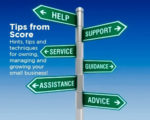Managing Your Business
 Question: I read a lot of hints, tips, and techniques for small business owners. What is the latest thinking in increasing the chances of success during the first year of business?
Question: I read a lot of hints, tips, and techniques for small business owners. What is the latest thinking in increasing the chances of success during the first year of business?
Answer: Frances Schagen, author of Your Effortless Business, synthesized the most often cited “truths” we tell small business owners and how to look at them differently which will maximize your potential for success.
You have to wear many hats. There is a myth that is passed from generation to generation of business owners that entrepreneurs need to do everything. Who can know it all? This attitude can only make a business owner feel inadequate if he or she needs to seek help. So, seek help in the areas where you are not strong. There are two functions that are necessary for small business success – sales and cash management. Everything else can be outsourced. You can do the financial data entry and have a bookkeeper reconcile the entries at the end of each month. You can hire a web designer to maintain your website and execute search engine optimization. Decide where you need help and get it early.
Invest in yourself. Too many small business owners don’t start with enough capital to survive the first year and pay or invest in themselves. SBA reports that 50% of small businesses fail in the first year. When you work and don’t pay yourself, the value of your contribution is diminished.
And, you feel even more stress than is normally felt in the startup months. When you don’t have enough cash to allow you to attend continuing education classes to stay abreast of your industry trends, you cannot stay competitive. If a three hour QuickBooks workshop is available that requires a fee to be paid and you don’t take advantage of it, you are shortchanging your business’ chance of success. If you don’t plan to invest in yourself, you won’t improve your skill level and the value in the business.
Marketing, finance, operations, and HR are the fundamentals of business. These are central functional areas of business. In the early stages of any business, the important work is that of the business, not managing the company. During the first few years, financial statements are only needed for filing taxes. What you need to do is what you do well, the work of the business and not try to focus on those areas you don’t do well – farm them out.
After you get the hard skills down, you can indulge in soft skills. Courage, wisdom, truth and beauty are soft skills vs. marketing, finance, operations and HR are hard skills. You cannot manage your way around difficult issues of startup. However, with the soft skills you have empathy for your customers and your employees. All the hardcore skills will not get you close to employees and customers.
Profit is the most important number. The most important metric in a start-up is cash flow, not profit. Why? Every possible dollar needs to be re-invested in the startup and the growth process.
A business plan is mandatory. Planning gives you a guide or compass to get from point A to point B. A business plan gives you the ability to generate investment dollars. Unless you need investment in the start-up or growth stages, you probably don’t need the traditional business plan. You might think about using the Business Model Canvas that condenses the business plan into one page, (email us and we’ll send you a template: capecodscore@verizon.net) The more important activity is to understand your market, your customers, where they are, what they want, can you fill that need and how to reach them. When you have the answers to these questions, you can test your business concept which will provide you all the information you need for the full business plan (if you need one at all).
Work hard. There is no question about it whatever way you look at it starting up, growing and managing a small business is hard work. We have lots of workshops on management of small businesses, but we don’t address fear and courage. Business ownership is fearful and takes courage to get up each morning and face the issues that arise each and every day. Small business owners need to focus on:
What are my clear and measurable objectives?
What are the fewest tasks I need to undertake to get to those objectives? How can I get those tasks done vs.? How can I do it all?
One of the keys to entrepreneurial success is to take time away from it periodically and regularly. Re-creating time. Think time. Time to allow you to focus on the issues from afar.











